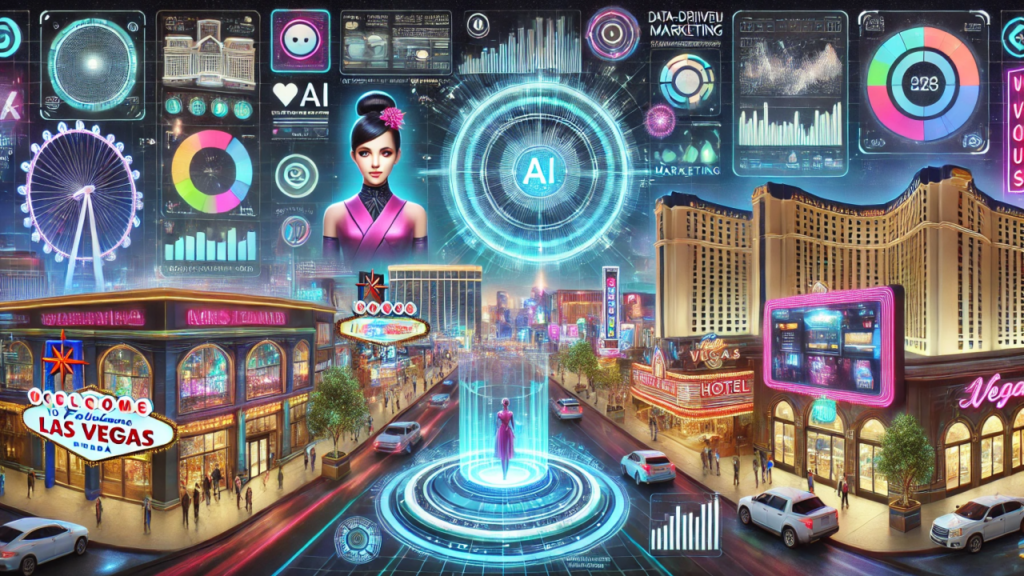
Artificial Intelligence (AI) is transforming B2C marketing in many industries, and those in the hospitality and gaming sector in Las Vegas are no exception. Through AI-based solutions, these industries are improving customer experience, automating processes to increase efficiency, and transforming marketing strategies to better reach target markets.
1. Personalization and Customer Engagement
AI empowers Las Vegas casinos and hotels to design personalized experiences that meet each guest’s individual preferences. By analyzing vast amounts of data, AI algorithms can forecast customer behaviors with high accuracy. AI-driven analytics, for example, offer casinos insight into players’ behaviors, enabling them to offer real-time hyper-personalized marketing that appeals to individual desires. This approach not only improves player engagement but also increases lifetime value and retention. (Las Vegas Weekly)(hospitalityupgrade.com)
Moreover, AI-powered chatbots and virtual assistants are transforming customer service by providing instant responses to guest inquiries, making the experience more enjoyable and memorable. These AI tools handle routine tasks, allowing human staff to focus on more complex interactions, thereby improving overall service quality. (Las Vegas Weekly)
2. Predictive Analytics & Dynamic Pricing
The predictive power of AI comes in very useful in terms of pricing and inventory management. This is applied by hotels and casinos to analyze trends in the market, demand fluctuations, and competitor pricing to dynamically set prices. Dynamic pricing, optimized in real-time, keeps them competitive while attempting to drive revenue to the fullest. AI, for example, can adjust room prices in accordance with real-time demand in the marketplace, competitor prices, and consumer preferences to improve profitability. (pitchgrade.com) (Followoz)
Additionally, AI assists in predicting customer demand, which leads to more effective inventory and resource planning. Through a better awareness of peak demand times and guest preferences, companies can best allocate staff, reduce operational expenses, and increase guest satisfaction.
3. Enhanced Security Measures
In the hospitality and gaming industries, security is a key pillar. Artificial Intelligence serves a vital function by greatly enhancing surveillance and fraud detection. Advanced machine learning algorithms enable enormous amounts of transactional information to be analyzed in real-time to identify irregularities, rapidly detecting suspicious activity like card counting, money laundering, and collusion between players with more effectiveness than traditional means. This forward-thinking approach strengthens compliance and operation integrity. (hospitalityupgrade.com)
4. Operational Efficiency & Automation
AI-driven automation is streamlining various operational aspects within hotels and casinos. From automating check-in processes with facial recognition technology to deploying robots for room service, AI reduces the workload on staff and enhances the guest experience. For instance, some Las Vegas establishments have introduced robots like Mix Master Moodie (a robot cocktail maker) or ADAM (a robot barista) to improve service efficiency. (digitalscholarship.unlv.edu)
Furthermore, AI offers useful assistance in staffing by predicting guest flow and planning employee shifts, so there’s a decent amount during busy times without having too many during slower times. This thoughtful balance not only results in savings, but it maintains high-quality service.
5. Marketing Strategies and Content Development
AI is transforming marketing strategies by enabling the creation of personalized content and targeted campaigns. For example, AI-generated content allows casinos to produce vast amounts of marketing material and game summaries without human input, driving gamblers to bet more frequently and for extended periods. (businessinsider.com)
Additionally, the application of AI in marketing has witnessed a staggering increase in purchases and a considerable reduction in customer churn. Taking into consideration factors like day and hour, email marketing that is personalized creates better engagement and customized offers to customers. Methods such as reinforcement learning in AI provide immediate feedback, greatly improving conventional marketing techniques. (The Wall Street Journal)
6. Adapting to AI: How Marketing Teams Are Evolving
The integration of AI in marketing processes calls for a shift in marketing teams’ working patterns in hospitality and gaming industries. Such teams now consist of AI specialists and data scientists who can analyze complex information and develop AI-based marketing strategies. This convergence of skill sets ensures that marketing activities achieve a perfect blend of creativity and analytical depth.
7. Embracing AI for Competitive Advantage
In the rich hospitality and gaming environment that characterizes Las Vegas, marketing teams are looking to AI in a bid to get ahead. Through AI technologies, they can provide personalized experiences, refine pricing strategy, enhance security protocols, and enhance efficiency in general. This considerate application of AI not only heightens customer satisfaction but also drives revenue growth and maximizes operational efficiency.
Challenges and Considerations
While AI has many benefits, it also comes with challenges marketing teams have to deal with.
- Data Privacy: Handling vast amounts of personal data requires stringent data protection measures to comply with regulations and maintain customer trust.
- Job Displacement: The automation of tasks traditionally performed by humans raises concerns about job losses. However, many establishments view AI as a complement to human workers rather than a replacement, aiming to enhance service quality while maintaining employment levels. (lasvegassun.com)
- Integration Complexity: Implementing AI solutions requires significant investment and integration with existing systems. Marketing teams must ensure that AI tools align with their overall strategy and infrastructure.
Future Outlook
The horizon for applications in hospitality and gaming in Las Vegas looks very promising. With advancements in AI, a variety of opportunities for use will arise, fostering a rich ecosystem defined by innovation, increased efficiency, and personalized experiences. The value of hospitality AI may reach a staggering $2.2 billion by 2025, supported by a staggering compound annual growth rate (CAGR) of 10.3% from year 2020. (lasveagssun.com) (transformhospitality.com)
Marketing teams that lead in adopting and harnessing AI technologies will be in a stronger position to meet changing demands in their target markets. Through it, they will achieve long-term growth and a competitive advantage in a constantly changing environment.
